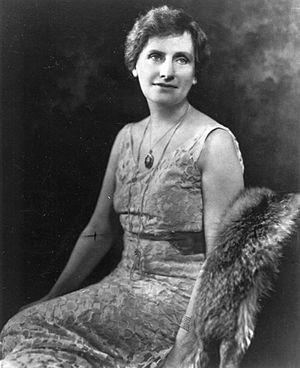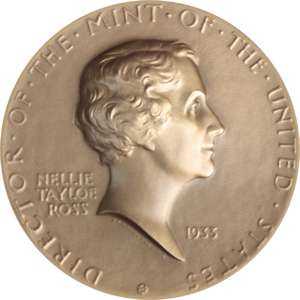Nellie Tayloe Ross facts for kids
Quick facts for kids
Nellie Tayloe Ross
|
|
|---|---|
 |
|
| 28th Director of the United States Mint | |
| In office May 3, 1933 – April 1953 |
|
| President | Franklin D. Roosevelt Harry S. Truman Dwight D. Eisenhower |
| Preceded by | Robert J. Grant |
| Succeeded by | William H. Brett |
| 14th Governor of Wyoming | |
| In office January 5, 1925 – January 3, 1927 |
|
| Preceded by | Frank Lucas |
| Succeeded by | Frank Emerson |
| First Lady of Wyoming | |
| In office January 1, 1923 – October 2, 1924 |
|
| Preceded by | Ida Mason Christy (1919) |
| Succeeded by | Ina Belle Craven |
| Personal details | |
| Born |
Nellie Davis Tayloe
November 29, 1876 St. Joseph, Missouri, U.S. |
| Died | December 19, 1977 (aged 101) Washington, D.C., U.S. |
| Political party | Democratic |
| Spouse |
William B. Ross
(m. 1902; died 1924) |
| Children | 3 |
Nellie Davis Tayloe Ross (November 29, 1876 – December 19, 1977) was an important American politician and educator. She made history as the first woman to become a state governor in the United States. She served as the 14th Governor of Wyoming from 1925 to 1927. Later, she became the 28th and first female director of the United States Mint, serving from 1933 to 1953. To this day, she is the only woman who has been governor of Wyoming.
Nellie Ross was born in St. Joseph, Missouri. Her family moved to Miltonvale, Kansas when she was young. After high school, she trained to be a teacher and taught kindergarten for four years. In 1902, she married William B. Ross. He later became the governor of Wyoming. After his death in 1924, Nellie Ross won a special election to take his place. This made her the first woman governor in the U.S. She supported laws that banned alcohol, known as Prohibition.
Even though she lost her re-election bid in 1926, she stayed active in the Democratic Party. In 1933, President Franklin D. Roosevelt chose her to lead the U.S. Mint. She worked well with the Assistant Director, Mary Margaret O'Reilly. Nellie Ross served five terms as Mint Director before retiring in 1953. She lived to be 101 years old, writing for magazines and traveling.
Contents
Early Life and Education
Nellie Davis Tayloe was born in St. Joseph, Missouri. She was the sixth child in her family. Her father, James Wynns Tayloe, was from Tennessee. Her mother, Elizabeth Blair Green, owned a large farm near the Missouri River. When Nellie was seven, her family moved to Miltonvale, Kansas. This happened after their old home burned down and they lost their property.
After graduating from Miltonvale High School in 1892, Nellie's family moved to Omaha, Nebraska. There, she taught piano lessons. She also completed a two-year program to become a kindergarten teacher. She then taught kindergarten for four years. In 1896, her brothers paid for her to take a trip to Europe.
In 1900, while visiting relatives in Tennessee, Nellie met William B. Ross. They married on September 11, 1902. They had three sons. William Ross was a lawyer who wanted to live in the American West. He moved to Cheyenne, Wyoming and started his law practice. Nellie joined him there. William Ross became a leader in Wyoming's Democratic Party. He served as a prosecuting attorney and ran for political offices, though he didn't win until he ran for governor.
Becoming Governor of Wyoming
In 1922, William Ross was elected governor of Wyoming. He was popular with voters who wanted new ideas. However, he died on October 2, 1924, after surgery. The Democratic Party then asked his wife, Nellie, to run for governor in a special election.
Nellie Ross chose not to campaign herself, but she still won the election easily on November 4, 1924. On January 5, 1925, she became the first woman governor in U.S. history. As governor, she continued her husband's plans. These included cutting taxes and helping farmers. She also worked for banking reforms and laws to protect children, women workers, and miners. She wanted Wyoming to approve a federal law against child labor. Like her husband, she also supported stronger laws against alcohol, known as Prohibition.
Nellie Ross ran for re-election in 1926. She had others campaign for her, but she lost by a small number of votes. She believed her loss was partly because she didn't campaign herself. She also thought her strong support for Prohibition hurt her. She remained very active in the Democratic Party. She campaigned for Al Smith in the 1928 presidential election. At the 1928 Democratic National Convention, she even received votes for vice president. She also gave a speech supporting Smith. After the convention, she became a vice chairman of the Democratic National Committee. She also directed the women's division of the DNC.
Leading the U.S. Mint
Appointed by President Roosevelt
On May 3, 1933, President Franklin D. Roosevelt chose Nellie Ross to be the director of the U.S. Mint. This made her the first woman to hold this important job. At first, Ross and the Mint's Assistant Director, Mary Margaret O'Reilly, were a bit unsure about each other. O'Reilly had worked at the Mint since 1904 and knew everything about it. Ross was a political choice with no Mint experience. But soon, they learned to respect each other and worked very well together.
Her Time as Director
Nellie Ross and Mary Margaret O'Reilly quickly found a good way to share their work. Ross handled public appearances and made big decisions. O'Reilly managed the daily operations of the Mint. Ross traveled a lot, visiting Mint factories and giving speeches to support President Roosevelt. This meant O'Reilly often ran the Washington office as acting director. The two women wrote friendly letters to each other. O'Reilly would write to Ross, telling her that she was keeping the office running smoothly. Ross's reports from her travels showed how the Mint recovered after the Great Depression. They started making many more coins to meet demand.
O'Reilly's Retirement
In 1935, Mary Margaret O'Reilly reached the age of 70, which was the mandatory retirement age for federal workers. Nellie Ross asked President Roosevelt to let O'Reilly stay longer. Ross said O'Reilly's knowledge was too important to lose. President Roosevelt agreed, and O'Reilly stayed for another year. During this time, Ross hired Frank Leland Howard to eventually take O'Reilly's place. Howard took over when O'Reilly finally retired in October 1938.
Her Achievements
During Nellie Ross's time as director, the Mint investigated some rare 1933 double eagle coins that were never supposed to be released. She is also known for starting the Franklin half dollar coin. She also began the process of making proof coins for people to buy. These are special, high-quality coins. Nellie Ross served five full terms as Mint Director. She retired in 1953.
Later Years and Death
After she retired, Nellie Ross wrote articles for different women's magazines. She also traveled a lot. Her last trip to Wyoming was in 1972, when she was 96 years old. Five years later, she passed away in Washington, D.C., at the age of 101. At the time of her death, she was the oldest former governor in the United States. She is buried in the family plot in Lakeview Cemetery in Cheyenne, Wyoming.
See also
 In Spanish: Nellie Tayloe Ross para niños
In Spanish: Nellie Tayloe Ross para niños
 | William L. Dawson |
 | W. E. B. Du Bois |
 | Harry Belafonte |


